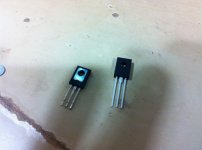The insulated collector type of transistor have similar characteristics for heat dissipation to exposed types. I prefer the insulated type as they are easier to fix to the metalwork and just need an aluminum oxide disc or plate to ensure maximum contact rather than the mica washer and heat sink compound that is required for the exposed type.
As the exposed transistors have aluminium pads and none exposed plastic pads then you will get better heat transfer with the aluminium pads.
This can be a nuisance as then you need insulating washers which restrict slightly heat transfer.
This can be a nuisance as then you need insulating washers which restrict slightly heat transfer.
Yes, but the junction-to-air resistance is higher. The insulated types therefore require a better heatsink or lower circuit dissipation for equal thermal characteristics. As example, I'm working with an LM1876 currently; seems the exposed tab is 1°C/W versus the isolated tab at 2°C/W.
Wayell I think the fully encapsulated devices are generally designed to be mounted to a heatsink, because if you don't mount them to a sink, it wouldn't matter if it had an electrically conductive bottom or not, right? The whole idea is to save hardware and assembly cost.
What sofaspud said.
What I don't understand is why they have to make the epoxy so darned thick!
What sofaspud said.
What I don't understand is why they have to make the epoxy so darned thick!
What I don't understand is why they have to make the epoxy so darned thick!
could be because the heat is transferred by the epoxy, and not through it, and the mass is better ?
No doubt the larger, all black surface has lower junction to air resistance, but I don't think it would be enough of a difference for me. If it has to lose a lot of power I'll put a sink on it.
I've actually ground down full encapsulated BD139/140 when I didn't have any with exposed metal tabs. That stuff is about .020" thick on the back of that case type.
I've actually ground down full encapsulated BD139/140 when I didn't have any with exposed metal tabs. That stuff is about .020" thick on the back of that case type.
As an aside, I have some TO-92 parts that have small P-shaped heatsinks epoxied on, with the part number printed on the sink. Can't recall the part numbers.
The TO-126 with the metal backing are generally intended for medium power amplifiers and the ones without are generally intended for small signal or driver applications. The epoxy does conduct heat quite well but still has a higher Rth than the metal tab. The larger package allows for larger surface area and thus faster heat transfer than a TO-92 or TO-92(L). Another option is TO-237, or TO-92 with the collector of the die mounted to a small metal tab that sticks out of the top of the package.
Raw metal is *always* better than epoxy or any other plastic, even if you have to use greased mica or silpads.
Now, if you don't push the chip to the limit, plastic is acceptable and sure saves on mounting time and complexity.
Specially in automated or non skilled labor assembly.
Now, if you don't push the chip to the limit, plastic is acceptable and sure saves on mounting time and complexity.
Specially in automated or non skilled labor assembly.
Yes, you can heatsink them.
If not they would not manufacture because they are not retarded.
Not that good alike exposed metal, but you have a reasonable heat transference.
People is not stupid, no one born stupid...if they did that way, is because was tested that way, and passed their test and heatsinking was obviously considered and studied... they do not want to fail or to close their business.
Carlos
If not they would not manufacture because they are not retarded.
Not that good alike exposed metal, but you have a reasonable heat transference.
People is not stupid, no one born stupid...if they did that way, is because was tested that way, and passed their test and heatsinking was obviously considered and studied... they do not want to fail or to close their business.
Carlos
Last edited:
- Status
- Not open for further replies.
- Home
- Amplifiers
- Solid State
- Can you heatsink a transistor without a exposed collector?
